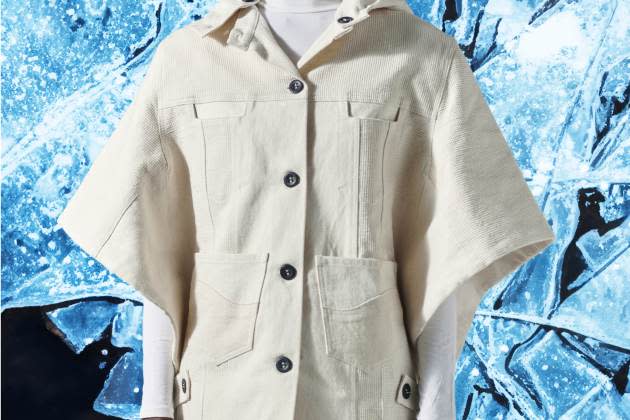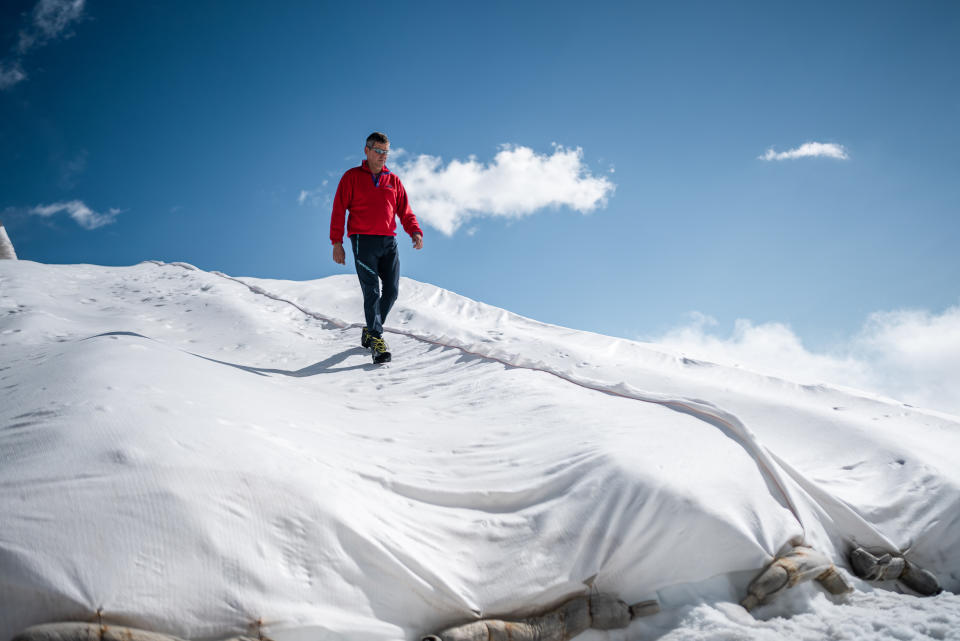Lenzing, Candiani Denim Collaborate on ‘Glacier Jacket,’ Chargeurs Partners With Central Saint Martins: Sustainability Week

GLACIER PACE: Art, the environment and the fashion industry came together in a project to protect glaciers as well as to promote circular textile solutions.
Fiber innovation firm Lenzing partnered with Italian manufacturer Candiani Denim and fashion studio Blue of a Kind on a pilot project to recycle glacier-protecting textiles into garments.
More from WWD
Sephora Unveils Two Global Sustainability Seals for Products
Dr. Martens Launches Reclaimed Leather Collection as Part of Sustainability Initiative
The result is the crisp, icy-white “Glacier Jacket” made from recycled geotextiles. Marchi & Fildi Spa handled the mechanical recycling process.
Geotextiles act as glacier guards, covering imperiled ice in order to slow mountain melt. The practice has been used before, but usually with fossil fuel-based fibers, which create plastic pollution. Lenzing launched a pilot project with its cellulose-based nonwoven material to protect glaciers across Austria in 2023.
Since geotextiles have a short shelf life of about two years, the project will give an end-of-life pipeline for the fabric. The glacier waste was sent to Candiani Denim in Italy, which created a white denim. The resulting fabric and garment are also fully recyclable.
“We view circularity as a valuable tool to develop sustainable solutions that have long-term continuity. This innovative concept not only involves the protection of glaciers but also the establishment of an Austrian-Italian network that can repurpose these protections and maximize the life span of their fibers,” said Candiani Denim global marketing director Simon Giuliani.

Lenzing vice president corporate sustainability Krishna Manda highlighted the pace at which the glaciers are melting and encouraged the fashion industry to come up with creative solutions to protect the environment. He called it a “rallying cry for collective action.”
“Together with our network of passionate industry experts, we can lead toward a substantial positive impact on our planet, safeguarding future generations. This project is an example to show the power of possibility when we collaborate,” he said.
The project was unveiled during a ceremony at the United Nations Office in Geneva, Switzerland, with a symbolic placing of the material over Italian contemporary artist Michelangelo Pistoletto’s sculpture “Rebirth.” The group also followed the development process with a film titled “Glacial Threads: From Forests to Future Textiles.”
The jacket will now be showcased during Milan’s Salone de Mobile in April.

TAKING CHARGEUR: Interlining company Chargeurs PCC is introducing its own educational program, following in the footsteps of other fashion suppliers working to ensure continuity to their know-how.
The company, part of France-based Chargeurs, a holding company publicly listed on the Paris Stock Exchange, has teamed with leading fashion schools in Europe, including Central Saint Martins in London, Institut Français de la Mode in Paris, IED in Milan and Florence’s Istituto Marangoni, to organize masterclasses for fashion design students.
The latter will be held throughout 2024 by the company’s management centered on apparel interlining products, new technologies in their manufacturing, as well as sustainability in the textile sector.
The Chargeurs PCC Academy program is aimed at filling a gap in today’s fashion education about the subject, said chief executive officer Gianluca Tanzi.
“With the Chargeurs PCC Academy, we want to enhance the educational programs by providing in-depth knowledge on what is a key component of any garment, both in terms of performance and fit and its impact on the supply chain and sustainability,” the CEO said. “Exchanging and debating with leading academics and the students is an opportunity for Chargeurs PCC to further progress its innovation, research and development, discover new talents and pass on professional know how to the future generations,” he added.
At the end of the training cycles, students will be offered materials from Chargeurs PCC for their end-of-year and graduate collections and the opportunity to access further training by the company’s professionals.
Kicking off with eight involved classes across the four fashion institutes, the company said it aims to roll out more collaborations on a global scale. — MARTINO CARRERA

ON THE HORIZON: The European Commission moved forward with its Horizon Europe strategic plan, outlining research and innovation funding for the next three years, with a key focus on climate change and loss of biodiversity.
“Textiles of the Future” is one of the nine new co-funded partnerships under the Horizon Europe umbrella, and will be comanaged by the European Technology Platform for Future of Textiles and Clothing, or ETP. The program will look at how the European Union textile companies can adapt and implement the bloc’s impending regulations under the EU Strategy for Sustainable and Circular Textiles.
“Textile research has been an integral part of the EU’s Framework Programmes for Research and Innovation for many years, but this dedicated partnership brings a strategic focus that is critical and timely to help our industry succeed in its green and digital transformation and reinforce Europe’s global leadership role in textile research, technology development and higher education,” said ETP Secretary General Lutz Walter.
The strategic plan will assess research and innovation and commits to provide support to activities from early-stage research to deployment. The EU has a slew of regulations on the way that will affect the textile and apparel businesses. But with the majority of the 200,000-strong European companies in the sectors being small businesses, these might not have access to the technology or resources to make the transition. This program will look for solutions to help these small businesses scale sustainable innovations.
Best of WWD

 Yahoo Lifestyle
Yahoo Lifestyle 
